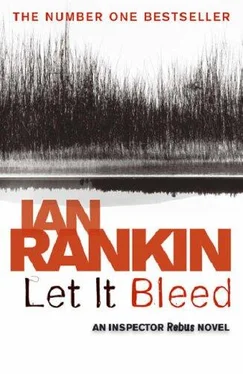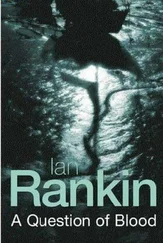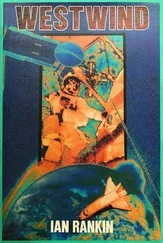Mrs Tweedie nodded. ‘So they are.’
Rebus started to get it. ‘But it’s not Willie’s and Dixie’s names in the rent book?’
‘They explained to me that they were … er, sub-something.’
‘Sub-letting?’
‘Aye, that’s it. From the lad who had the house before them.’
‘And what’s his name, Mrs Tweedie?’
‘Well, his first name’s Paul. I don’t know his second. Nice young lad, always smartly dressed. Only thing I didn’t like, he wore one of those …’ She tugged her ear and made a face. ‘Doesn’t look at all right on a man.’
‘Paul Duggan?’ Rebus suggested.
She tried the name out. ‘You know,’ she said, ‘you could be right.’
As Rebus drove out on to Gorgie Road he had a song in his head. It was an old Neil Young number, ‘The Needle and the Damage Done’. He stopped the car in front of the jail to collect his thoughts. An access road ran from Gorgie Road up to the gatehouse, the tall fence, and the solid building behind with its massive door and large clock. Though not yet five o’clock, it was dark, but the prison was well lit. Officially it was HM Prison Edinburgh; but everyone knew it as Saughton Jail. The main building looked like a Victorian workhouse.
They’d have ended up in jail, he thought to himself. They knew even a hoax kidnapping was a serious offence.
Willie Coyle, the taller, the fair-haired of the two. Rebus was imagining what had gone through Willie’s mind in those final seconds before he took the plunge. Dixie and he would go to jail. They’d almost certainly be separated: different wings if not different jails. Dixie would have no one to look after him. Rebus thought of Lenny in Of Mice and Men. Dixie had been an injector, maybe he’d been helped off, helped by his friend Willie. But in Scotland’s jails, there were plenty of drugs. Of course, you’d have to have something to trade, and a boy Dixie’s age always had something to trade.
Had Willie weighed up the options? And had he then hugged his friend, hugged him to death? Rebus was beginning to like Willie Coyle. He was wishing he wasn’t dead.
But he was, they both were. Cold and commingled on the slab, leaving not much behind except the fact that Paul Duggan was a very cool customer indeed. Rebus would be talking to Paul Duggan, sooner rather than later. But for now he had other people to see, another appointment. It was the one appointment he’d known all day he would keep, come hell or high water.
There was a gas-fire, the kind that gave out actual flames, burning in what looked like the original grate; and smoke too, though the smoke came from cigarettes and pipes. The TV was on, all but drowned out by the live music. As often happened on a winter’s evening, Edinburgh’s folk musicians managed to find themselves in the same pub at the same time. They were playing in a corner: three fiddles, a squeeze-box, a bodhran, and a flute. The flautist was the only woman. The men were bearded and ruddy-cheeked and wore thick-knit jumpers. The pints on their table were three-quarters full. The woman was thin and pale with long brown hair, but her cheeks were bright from firelight.
A few customers were up dancing, arms linked and birling in what space there was. Rebus liked to think they were just keeping warm, but in fact they looked like they were having fun.
‘Three more halfs and a couple of nips,’ he told the barman.
‘And what are your friends drinking?’
‘Ha ha,’ said Rebus. He was flanked at the bar by his drinking companions, George Klasser and Donny Dougary. While Klasser was known as ‘Doc’, Dougary was called ‘Salty’. Rebus didn’t know either of them very well outside the confines of the pub, but most evenings between six and half-seven they were the best of pals. Salty Dougary was trying to be heard above the general confusion.
‘So what I’m saying is, you can go anywhere on the superhighway, any where, and in future it’ll be even bigger. You’ll do your shopping by computer, you’ll watch telly on it, play games, listen to music … and everything will be there. I can talk to the White House if I want: I can download stuff from all over the world. I sit there at my desk and I can travel anywhere.’
‘Can you travel to the pub by computer, Salty?’ a drinker further down the bar asked.
Salty ignored him and held his thumb and forefinger a couple of inches apart. ‘Hard disks the size of credit cards, you’ll have a whole PC in the palm of your hand.’
‘You shouldn’t say that to a policeman, Salty,’ George Klasser offered, causing laughter. He turned to Rebus.
‘How’s that tooth?’
‘The anaesthetic helps,’ Rebus said, tipping the last of his whisky into his mouth.
‘I hope you’re not mixing alcohol and painkillers.’
‘Would I do that? Salty, give the man some money.’
Salty stopped talking to himself. The barman was waiting, so he pulled out a ten-pound note, watching its sad ebbing as it flowed into the till. Salty was called Salty because of salt and sauce, which were what you put on your chip-shop supper. The connection being chips, since Salty worked in an electronics factory in South Gyle. He’d been a late arrival in ‘Silicon Glen’, and was hoping the industry would continue to prosper. Six factories before this one had closed on him, leaving long periods of jobless space between them. He still remembered the days when money was tight — ‘I could have collected Social Security for Scotland’ — and watched his money accordingly. He made microchips these days, feeding an assembly plant on Clydeside and another in Gyle Park West.
‘Ye dancing?’
Rebus half turned to see a woman grinning toothlessly at him. He thought her name was Morag. She was married to the man with the tartan shoelaces.
‘Not tonight,’ he said, trying to look flattered. You could never tell with the man with the tartan shoelaces: dance with his wife and you were flirting; turn her down and you were, by implication, snubbing him . Rebus rested his foot on the polished brass bar-rail and drank his drinks.
By eight o’clock, both Doc and Salty had left, and an old guy in a shapeless bunnet was standing next to Rebus. The man had forgotten his false teeth, and his cheeks were sunken. He was telling Rebus about American history.
‘I like it, ken. Just American, not any other kind.’
‘Why’s that?’
‘Eh?’
‘Why just American?’
The man licked his lips. He wasn’t focusing on Rebus, or on anything in the bar. You couldn’t be sure he was even focusing on the present day.
‘Well,’ he said at last, ‘I suppose it’s because of the Westerns. I love Westerns. Hopalong Cassidy, John Wayne … I used to like Hopalong Cassidy.’
‘Could It Be Forever,’ said Rebus, ‘that was one of his.’
Then he finished his drink and went home.
The telephone was ringing. Rebus considered not answering; resistance lasted all of ten seconds.
‘Hello?’
‘Hello, Dad.’
He flopped into his chair. ‘Hello, Sammy. Where are you?’ She paused too long. ‘Still at Patience’s, eh? How are you?’
‘Fine.’
‘How’s work?’
‘You really want to know?’
‘Just being polite.’ Fatherly, he thought suddenly: I should have said fatherly, not polite. Sometimes he wished life had a rewind function.
‘Well, I won’t bore you with the details then.’
‘I take it Patience is out?’ It stood to reason: Sammy never called when she was home.
‘Yes, she’s out with … I mean at something. She’s out at something.’
Rebus smiled. ‘What you really mean is that she’s out with someone.’
Читать дальше












